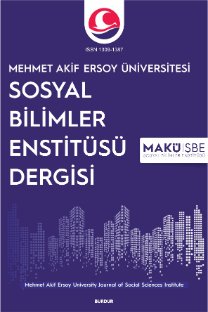ÇEVRE BİLİNCİ, ÇEVRECİ EV UYGULAMALARI, SATIN ALMA DAVRANIŞI VE DEMOGRAFİK FAKTÖRLER ARASINDAKİ İLİŞKİNİN HANELER KAPSAMINDA İNCELENMESİ
Çevre Bilinci, Çevreci Ev Uygulamaları, Çevreci Satın Alma, Demografik faktörler
INVESTIGATION OF THE RELATIONSHIP BETWEEN ENVIRONMENTAL AWARENESS, ENVIRONMENTAL HOUSE PRACTICES, PURCHASING BEHAVIOR AND DEMOGRAPHICS
Environmental Awareness, Environmental Household Practices, Environmental Purchasing, Demographics,
___
- Barr, S. ve Gilg, A. (2006). Sustainable lifestyles: framing environmental action in and around the home. Geoforum, 37, 906–920.Baumert, K. A., Herzog, T. ve Pershing, J. (2005). Navigating the numbers: Greenhouse gas data and international climate policy. World Resources Institute, http://pdf.wri.org/navigating_numbers.pdfBayraktar, M. (1989). Tüketici kararları ve çevre. Standard Dergisi, 334(28), 15-27.Büyüker İşler, D. (2015). Çevresel tutum ve tüketim değerleri teorisi çerçevesinde tüketicilerin yeşil ürün satın alma davranışları. 20. Ulusal Pazarlama Kongresi, Anadolu Üniversitesi, Eskişehir, 561-576.Erkal, S.; Şafak, Ş. ve Yertutan, C. (2011). Sürdürülebilir kalkınma ve çevre bilincinin oluşturulmasında ailenin rolü. Sosyoekonomi, 14(14), 145-158.Gleim, M. R. (2011). From green to gold: Three essays on corporate social responsibility as a marketing strategy, Yayınlanmamış Doktora Tezi, The Florida State University, College of Business, Florida.Hertwich, E. G. and Peters, G. P. (2009). Carbon footprint of nations: a global, trade-linked analysis. Environmental Science ve Technology, 43, 6414–6420.Huang, C., Vaneckova, P., Wang, X., FitzGerald, G., Guo, Y. ve Tong, S. (2011). Constraints and barriers to public health adaptation to climate change: a review of the literature. American Journal of Preventive Medicine, 40(2), 183-190.IPCC (2014). Climate change 2014: synthesis report. Contribution of Working Groups I, II and III to the Fifth Assessment Report of the Intergovernmental Panel on Climate Change [Core Writing Team, RK Pachauri and LA Meyer (eds.)]. IPCC, Geneva, Switzerland.Kinnear, T. C., Taylor, J. R. ve Ahmed, S. A. (1974). Ecologically concerned consumers: who are they?. Journal of Marketing, 38, 20-24. Kükrer, Ö. (2012). Tüketicilerin çevresel sorumluluklarının yeşil reklamlara yönelik tutumlarına etkisi: Eskişehir örneği. Journal of Yaşar University, 26(7), 4505-4525.Minton, A. P. ve Rose, R. L. (1997). The effects of environmental concern on environmentally friendly consumer behavior: An exploratory study. Journal of Business Research, 40(1), 37-48.Nguyen, T. T. P., Zhu, D. ve Le, N. P. (2015). Factors influencing waste separation intention of residential households in a developing country: Evidence from Hanoi, Vietnam. Habitat International, 48, 169-176.Pagiaslis, A. ve Krontalis, A. K. (2014). Green consumption behavior antecedents: Environmental concern, knowledge, and beliefs. Psychology & Marketing, 31(5), 335-348.Salo, M., Nissinen, A., Lilja, R., Olkanen, E., O'Neill, M. ve Uotinen, M. (2016). Tailored advice and services to enhance sustainable household consumption in Finland. Journal of Cleaner Production, 121, 200-207.Sekaran, U. (1992). Research methods for business: A skill building approach. New York: John Wiley&Sons Inc.Swami, V., Chamorro-Premuzic, T., Snelgar, R., ve Furnham, A. (2011). Personality, individual differences, and demographic antecedents of self-reported household waste management behaviours. Journal of Environmental Psychology, 31, 21-26.Tadesse, T. (2009). Environmental concern and its implication to household waste separation and disposal: Evidence from Mekelle, Ethiopia, Resources, Conservation and Recycling, 53(4), 183-191.Tantawi, P., O’Shaughnessy, N., Gad, K. ve Ragheb, M. A. S. (2009). Green consciousness of consumers in a developing country: a study of egyptian consumers. Contemporary Management Research, 5(1), 29-50.UNFCC (United Nations Framework Convention on Climate Change) (2015). INDC submission. http://unfccc.int/focus/indc_portal/items/8766.phpXu, L., Ling, M., Lu, Y. ve Shen, M. (2017). External influences on forming residents’ waste separation behaviour: Evidence from households in Hangzhou, China. Habitat International, 63, 21-33.Yücel, M. ve Ekmekçiler, Ü. S. (2008). Çevre dostu ürün kavramına bütünsel yaklaşım; Temiz üretim sistemi, eko-etiket, yeşil pazarlama. Elektronik Sosyal Bilimler Dergisi, 7(26), 320-333.Zimmer, M. R., Stafford, T. F. ve Stafford, M. R. (1994). Green issues: dimensions of environmental concern. Journal of Business Research, 30(1), 63-74.
- Yayın Aralığı: 4
- Başlangıç: 2009
- Yayıncı: Burdur Mehmet Akif Ersoy Üniversitesi Sosyal Bilimler Enstitüsü
İŞVEREN MARKASI ALGISININ ETKİLİ LİDERLİK İLE İLİŞKİSİ VE BİR ARAŞTIRMA
Bünyamin AKDEMİR, Emine KARAKAPLAN ÖZER
MAHALLEYE DÖNÜŞEN KÖYLER ÜZERİNE BİR İNCELEME
TÜRKİYE’DE ASKERİ DARBE DÖNEMLERİNDE NÜFUS POLİTİKALARINA YÖNELİK DÜZENLEMELER
DANIŞTAY KARARLARI IŞIĞINDA KENTSEL DÖNÜŞÜMÜN HUKUKİ BOYUTU
Nematollah AGHABALAEI FANID, Dilek KAVACIK
LIVIUS ANDRONICUS VE LATİN EDEBİYATI’NDAKİ YERİ VE ÖNEMİ
Zeliha Merve ACAR, Nedret ÇAĞLAR
BÖLGESEL KALKINMA ÜZERİNE HAZIRLANAN LİSANSÜSTÜ TEZLERE YÖNELİK BİBLİYOMETRİK BİR ARAŞTIRMA
Süha ÇELİKKAYA, Hakan DEMİRGİL
ÇALIŞAN MUTLULUĞUNUN VE İŞE BAĞLILIĞIN ÖRGÜT PERFORMANSINA ETKİSİ
